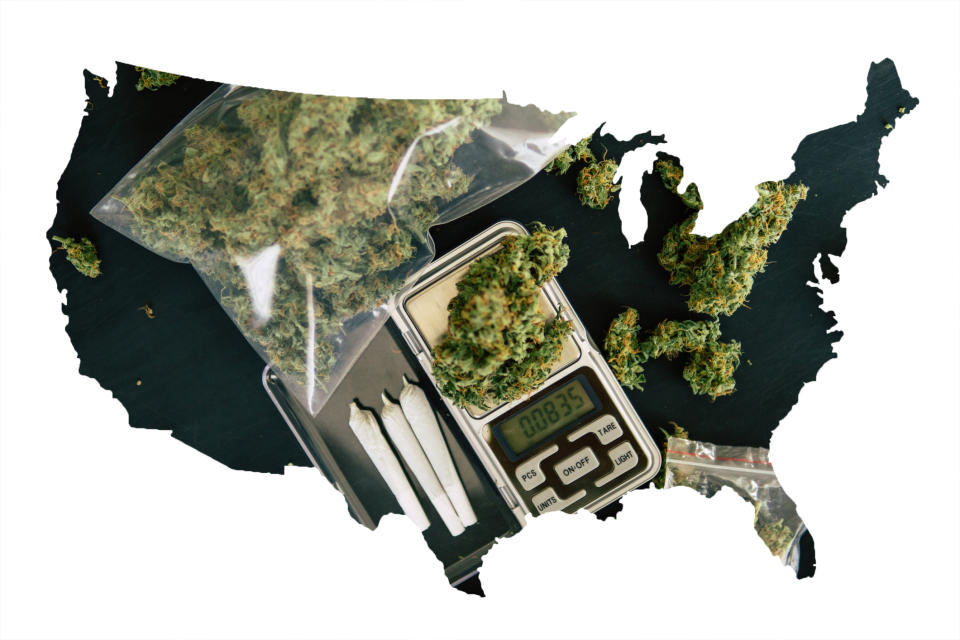Why Is Legalizing Pot Proving So Difficult in the United States?
The marijuana industry has appeared nothing short of unstoppable on a global scale in recent years. To our north, Canada became the first industrialized country in the world to legalize recreational cannabis this past October.
Meanwhile, to our south, Mexico gave the green light to medical marijuana in June 2017. Nowadays, there are more than 40 countries worldwide that allow a physician to prescribe medical cannabis in some capacity.

Image source: Getty Images.
And yet, in the United States, it's truly a mixed bag. On one hand, an all-time record number of Americans (66%) now favor the idea of nationwide legalization. We've witnessed this support translate into 33 states having legalized medical cannabis, 10 of which also allow adult consumption. If cannabis were entirely legal in the U.S. as in Canada, it would almost certainly be the most lucrative weed market in the world.
On the other hand, the U.S. federal government has been largely unwavering on its view of marijuana, holding firm on its Schedule I classification. In plain English, this means it's illegal, prone to abuse, and has no recognized medical benefits. As long as this federal classification exists, there remains a pretty firm ceiling on marijuana's potential within the United States.
Why is legalizing cannabis in the U.S. so tough?
You might be wondering why, with support and momentum as strong as it is, legalizing pot in the U.S. is proving so difficult. The answer to that question is actually a combination of factors.
First, we can state the obvious: Support for legalization really depends on party preference. In Gallup's October 2018 poll, 75% of self-identified Democrats and 71% of Independents favored legalization, compared to just 53% of self-identified Republicans. Although this was actually an all-time high for GOP support in Gallup polling, there's a pretty defined line in the sand when it comes to pushing for reform. Since Republicans control the Senate and the Oval Office, there's simply no pressing need to push for legalization, even with the American public firmly in favor of cannabis reform.
This brings up another important point: marijuana's political importance. While we're seeing a number of Democratic presidential candidates place their support behind legalization in the early going, an April 2018 survey from the independent Quinnipiac University showed that weed simply isn't a polarizing enough topic as of yet to sway voters. Respondents were asked if they could vote for a candidate who shared most of their views but held an opposite view on cannabis. Only 13% suggested that they wouldn't vote for the candidate in question, while 82% could still vote for a candidate with other similar views. This implies that politicians are in little danger of losing their elected seat in Washington, even if they hold an unpopular view on marijuana.

Image source: Getty Images.
Thirdly, legalization creates a money problem for the federal government. As a Schedule I drug, businesses that deal in cannabis are disallowed from taking normal corporate income tax deductions, per Section 280E of the tax code. With only cost of goods sold able to be deducted from revenue, most profitable weed companies pay a very high effective tax rate. If marijuana were suddenly legalized, it would no longer subject these companies to Section 280E, thereby costing the federal government about $5 billion in total tax revenue over the next decade.
To add to this point, instituting a federal excise tax on legal cannabis isn't necessarily a fix-all, either. Every federal, state, and local tax attached to cannabis drives up its cost relative to the black market. Some locales in California are already paying close to 45% in aggregate tax, which is only going to drive consumers back to the black market.
In order for cannabis to really have a shot at legalization, we'd probably need to see Democrats hold a majority of congressional seats, and the economic benefits of legalization would really have to wow lawmakers.
Telltale signs that legalization is coming
Although the marijuana industry is currently being stifled by the U.S. federal government, one industry that's been recently given the all-clear is hemp.
In December, President Trump signed the Farm Bill into law, legalizing hemp and hemp-derived products (mostly cannabidiol, or CBD, products) for commercial production and sale. CBD is the nonpsychoactive cannabinoid best known for its perceived medical benefits. As a result, companies that produce hemp-based oil and CBD products have thrived, such as Charlotte's Web Holdings (NASDAQOTH: CWBHF) and CV Sciences (NASDAQOTH: CVSI).

Image source: Getty Images.
But what's been particularly interesting about hemp's legalization in the U.S. is how eager a handful of Canada's largest marijuana growers have been to enter the U.S. hemp industry. In mid-January Canopy Growth (NYSE: CGC) announced that it was awarded a hemp production and processing license in New York State. Canopy will now spend between $100 million and $150 million to develop a hemp-processing facility in New York.
Also in mid-January, the highest projected pot producer in Canada, Aurora Cannabis (NYSE: ACB), detailed its imminent entrance into the U.S. hemp industry. Said Aurora's chief corporate office Cam Battley in an interview with Business Insider, "We'll be unveiling our hemp-derived CBD strategy to enter the U.S. market over the next few months."
While both Canopy Growth and Aurora Cannabis have made very clear that they don't intend to enter the U.S. cannabis market as long as it remains illegal at the federal level, their push into the hemp market provides some of the infrastructure that would be needed to be successful if the federal government ever did legalize marijuana. Furthermore, their willingness to spend on infrastructure in the U.S. appears to be a telltale sign that they believe cannabis legalization is coming pretty soon.
Suffice it to say, a battle is brewing on Capitol Hill over marijuana, so grab your popcorn.
More From The Motley Fool
Sean Williams has no position in any of the stocks mentioned. The Motley Fool has no position in any of the stocks mentioned. The Motley Fool has a disclosure policy.
